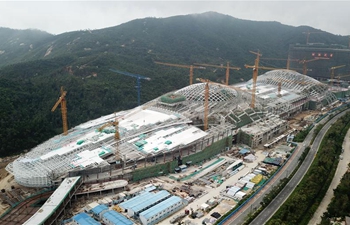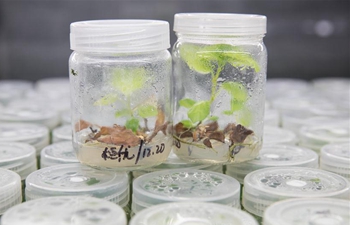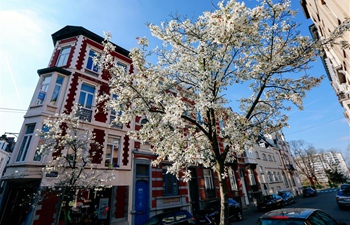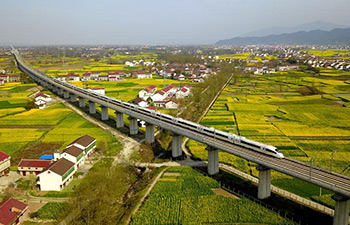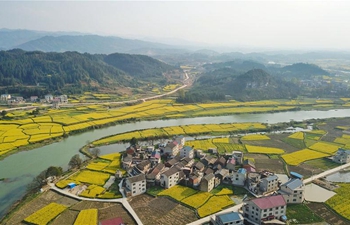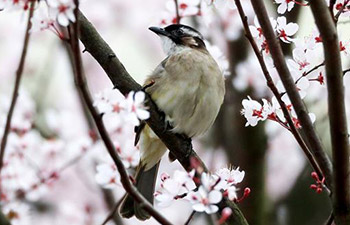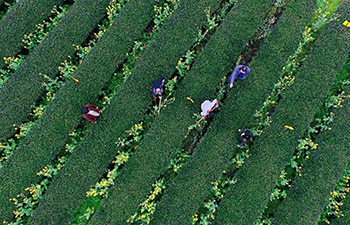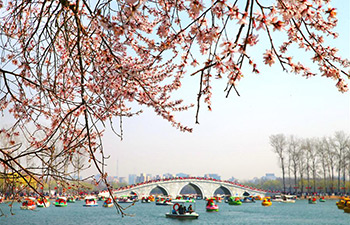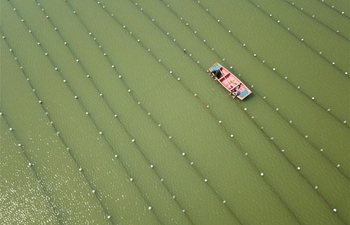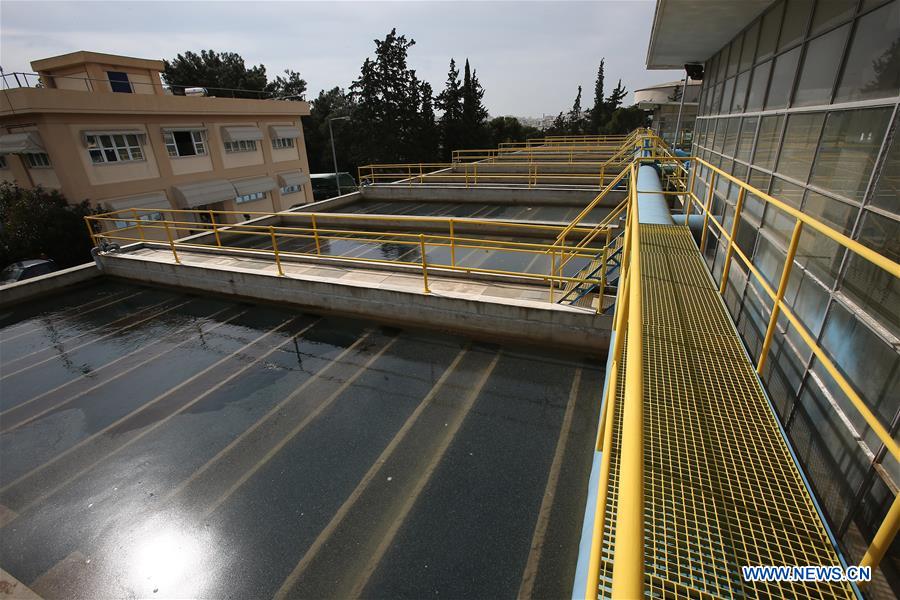
Photo taken on March 20, 2019 shows the facilities of a water treatment plant in Galatsi, at the northern suburbs of Athens, Greece. The Water Treatment Plant of Galatsi in Athens has been in operation since the early 20th century. (Xinhua/Marios Lolos)
by Maria Spiliopoulou, Valentini Anagnostopoulou
ATHENS, March 22 (Xinhua) -- Despite the draconian austerity adopted during an eight-year bailout program to afloat the country's debt-laden economy, the quality of tap water reaching Greek households remains one of the best in the world, officials told Xinhua in recent interviews ahead of the World Water Day which falls on Friday.
"We can be proud of having one of the best, let's say, waters worldwide... Chemists working here have told me that they give to their babies unboiled water," said Ioannis Benisis, CEO of the state-owned Athens Water Supply and Sewerage Company (EYDAP S.A.), which serves about 4.5 million customers, about half of Greece's population.
The company was awarded a top 10 rating for the high quality of drinking water two years ago, when the European Commission issued the first Urban Water Atlas for Europe on water management in European cities and regions.
Speaking to Xinhua, Benisis explained how this result was achieved and how awareness is raised in particular among younger generations on the protection of water resources.
Greece did not join in the industrialization race of the early 19th century, but remained mainly an agriculture-based economy. Benisis said the underground remains unpolluted by chemicals and pesticides for decades, which ensure the country's clean water resources.
EYDAP mainly uses water from surface water sources, such as Evinos river in western Greece, Yliki and Mornos lakes in central Greece and Marathonas lake, 40 km northeast of Athens, and also underground water resources.
Benisis was echoed by Petros Varelidis, Director the National Center of Environment and Sustainable Development of the Ministry of Environment which monitors the quantities and quality of all water resources nationwide.
"Our water quality is very good, because there are not so many pressures as in other countries. For several reasons the quality of the environment in Greece is excellent and this is reflected also on surface and underground water resources," said Varelidis.
Greece is in the top 10 countries across the world regarding the quality and access to drinking water, he stressed, citing other surveys.
Benisis believes that Greece's purification process and 24-hour monitoring over the water quality also contribute to the country's tap water quality.
From reservoirs via an extensive aqueduct system the water is transferred to EYDAP's Water Treatment Plants (WTP) where it is processed to be drinkable.
The company's experts gather about 12,000 samples from the reservoirs and the entire transfer and distribution network which has a total length of 9,500 km, to check the quality of water, he explained.
Xinhua was given a tour at the Marathon lake facilities, and the Water Treatment Plant of Galatsi in Athens, which is in operation since the early 20th century. ISO certified laboratories are constantly updated, Benisis stressed.
"In health and environment issues, we are obliged to do whatever possible. Of course the crisis and financial woes are there, but in health issues we cannot make discounts, for the environment as well. We cannot risk the water's quality by making fewer analyses or not modernize our laboratories for financial reasons," he said, recalling the tough days during the bailout, which just ended last summer.
Cutbacks have been made in other fields to keep the water's price low.
"The water's price has not increased in recent years. It is very low. The average household pays 15 euros (17 U.S. dollars) for three months. I think it is quite economic for good quality drinking water," Benisis said.
"The water should be provided free of charge. However, for environmental protection reasons, in order to ensure there will be no waste, there is a price," he explained.
"Regarding citizens the pricing is a tool that works," Varelidis agreed. "When one surpasses a level of consumption, then the cost is increasing per cubic meter," he explained.
In the past Athens faced water shortages and at a point was only 120 days away from not having a drop of water, Benisis noted.
"Thanks to the works we have done to the network, the minimization of leakages and the creation of special zones, etc. we have managed, of course the rainfalls helped, to have record water reserves at this moment," he said.
According to EYDAP's water reserves report, the company can now supply water for the next 1,500 days even if there will be no rain or snowfall at all.
However, not all regions of Greece have such impressive reserves.
"There is imbalance in water resources availability in Greece. There is abundance in the west, fewer quantities in the east, more water in the north, less in the south, and in parallel there is bigger demand in the south, in particular if we include Crete and other islands which are popular tourism destinations," Varelidis told Xinhua.
In order to ensure access to good quality tap water for all, the state invests in more infrastructure works to tackle leakages and save water, while more and more desalination plants replace the traditional transfer of water by aquifer ships to islands, he said.
Even when the indexes look good, Greek officials stay on alert, they both said.
"We want to educate people, citizens to use water wisely, because we don't know whether climate change will knock on our door with drought tomorrow or in five or 10 years. We must teach children now that we should not waste water," Benisis said. (1 euro = 1.13 U.S. dollars)

